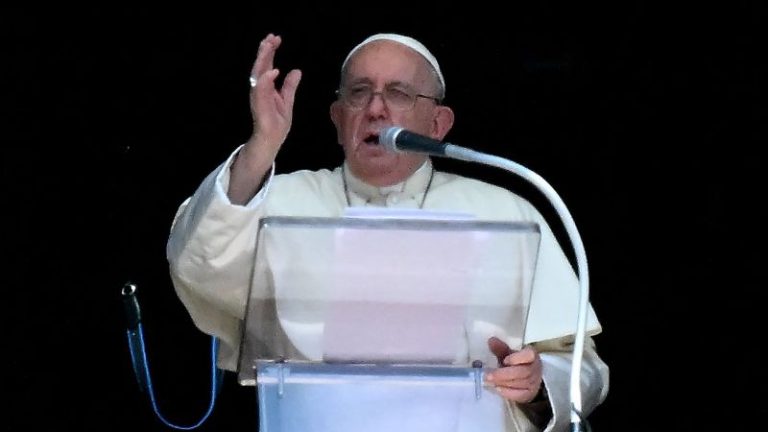Pope Francis has suggested for the first time that people in same-sex unions could be blessed by Catholic priests on a “case-by-case” basis, a seeming reversal of previous statements.
The Pope made the suggestion in a letter to his harshest critics within the Catholic ranks, written in response to a letter from five conservative cardinals with formal questions – called a “dubia” (Latin for “doubt”) – which is an official request for a yes or no answer from a sitting pontiff regarding his running of the Church.
The cardinals, Walter Brandmuller, Raymond Leo Burke, Juan Sandoval Iniguez, Robert Sarah and Joseph Zen Ze-kiun, first sent the letter to Pope Francis on July 10. It focused on an upcoming October meeting of bishops, asking what impact it could have on Church’s teaching, and included questions about the Pope’s intention to bless same-sex unions, and whether he intends to open the door to women priests through ordination.
Unsatisfied with the Pope’s initial response, according to a blog post by American Cardinal Raymond Burke, the five cardinals reworded the “dubia” letter and sent it again on August 21, citing “the gravity of the matter,” according to Burke.
The Vatican then released a letter in Spanish dated September 25 signed by Cardinal Victor Manuel Fernández, the Vatican’s new chief of doctrine. The response includes Pope Francis’ answers to the dubia, signed “Francis.”
On the issue of homosexual unions, the pontiff reiterated that the church only recognizes marriage as a union between a man and a woman, but opened the door for blessings of individuals in same-sex unions, the letter shows.
“When you ask for a blessing, you are expressing a request for help from God, a prayer to be able to live better, a trust in a father who can help us live better,” the Pope wrote, adding that a clergy must show “pastoral prudence must adequately discern if there are forms of blessing, requested by one or various people, which do not convey a wrong concept of marriage.”
The Pope’s response appears to contradict his statement in March, when he said the Church could not bless same-sex unions, because they could “not bless sin.”
The latest development appears to be a nod to a decision made by the German Church in March and carried out in August, in which same-sex unions received a Catholic blessing by several priests in the city of Cologne.
On the issue of women’s ordination, the pontiff was clear that he upheld the words of the late Pope John Paul II, who said in 1994 that the (Catholic) Church had “no authority” to ordain women, but said that the issue needed to be studied in order to educate those who doubt it, the letter said.
“If is not understood and the practical consequences of these distinctions are not drawn, it will be difficult to accept that the priesthood is reserved only for men and we will not be able to recognize the rights of women or the need for them to participate, in various ways, in the leadership of the Church,” the Pope added.
On the issue of the impact the upcoming meeting of Catholic bishops may have on the church’s teaching, Pope Francis was vaguer, writing, “Both the hierarchy, and the entire People of God in different ways and at different levels can make their voice heard and feel like part of the Church’s journey. In this sense we can say that yes, synodality, as style and dynamism, is an essential dimension of the life of the Church.”
He also added that attempts to “sacralize or impose a certain synodal methodology that pleases one group, transforming it into a norm and an obligatory path for everyone, because this would only lead to ‘freezing’ the synodal path.”
The upcoming Synod in Rome has been met with skepticism by the conservative corners of the Church who have expressed concern both that women will have a voice, and that the Church’s teaching is not carried out by consensus.

